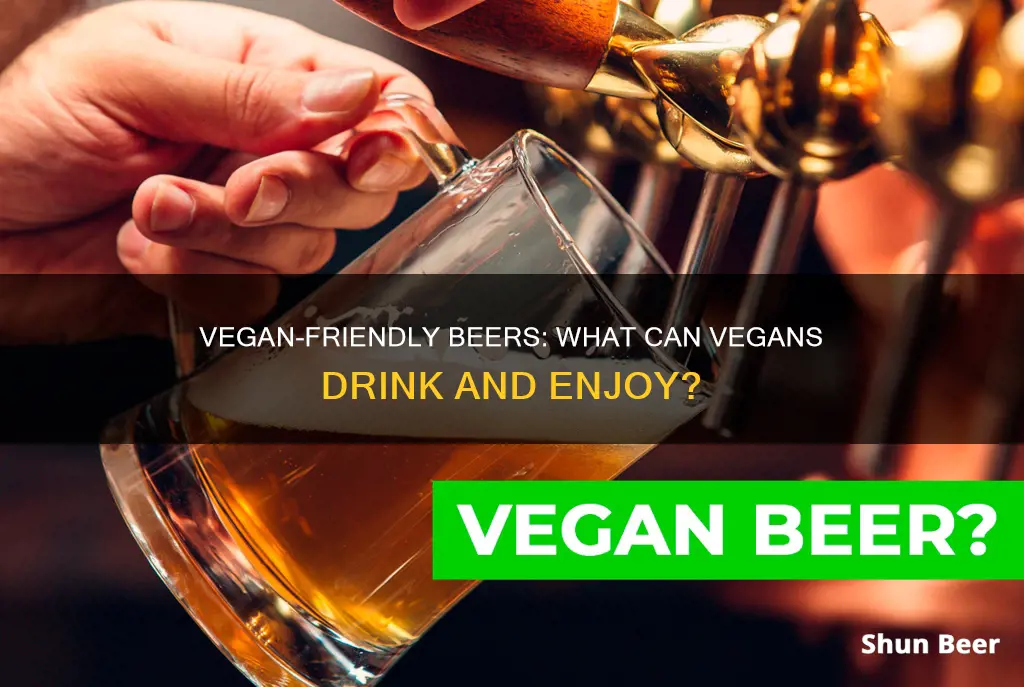
Vegans can drink beer, but they need to be careful about what they choose. While the core ingredients in beer are plant-based, some brewers add non-vegan ingredients such as lactose, honey, or animal-derived finings. Isinglass, a common fining agent, is made from the dried swim bladders of fish and is used to clarify beer. Other animal-derived fining agents include gelatine and egg. Vegan beers use alternative fining agents such as Irish moss, a type of carrageenan seaweed, or simply allow the beer to settle naturally. While it can be difficult to find out if a beer is vegan, resources such as Barnivore.com provide lists of vegan beers.
| Characteristics | Values |
|---|---|
| Core ingredients | Malted barley, yeast, hops, water |
| Specialist ingredients | Oats, rye, wheat |
| Non-vegan additives | Lactose, honey |
| Clarifying agents | Isinglass (fish bladder), gelatin (bone/flesh/ligaments), egg |
| Vegan finings | Irish moss, pea protein |
| Vegan-friendly beers | Corona, Budweiser, Guinness, Coors, Heineken, Miller, Stella Artois, Sierra Nevada Pale Ale, Blue Moon Belgian White, Golden Road Point the Way IPA, Amstel, Asahi, Dos Equis, Keystone, Kirin, Modelo, Negra Modelo, Newcastle, Pacifico, Samuel Adams Boston Lager, Yuengling |
What You'll Learn
- Beers to avoid: milk stouts, oyster and cream stouts, smoothie beers, and Guinness (in some places)
- Beers to enjoy: Corona, Budweiser, and Guinness (everywhere now)
- What to look out for: isinglass, gelatin, lactose, honey, and egg?
- How to find out: Barnivore.com is a database that tracks vegan beers?
- The future: an increase in vegan-friendly beers

Beers to avoid: milk stouts, oyster and cream stouts, smoothie beers, and Guinness (in some places)
While the core ingredients of beer—malted barley, yeast, hops, and water—are vegan, some beer varieties are not. Beers to avoid if you're vegan include milk stouts, oyster and cream stouts, smoothie beers, and, in some places, Guinness.
Milk stouts are traditionally brewed with lactose, a non-vegan additive derived from milk. However, some breweries are now using dairy alternatives such as almond milk, soy milk, and coconut milk to create vegan-friendly milk stouts. These beers are said to have the same luscious, dessert-like qualities as their non-vegan counterparts.
Oyster stouts, as the name suggests, contain oysters. An example of a non-vegan oyster stout is Hardywood Oyster Stout, which is brewed by Hardywood Park Craft Brewery.
Cream stouts, like milk stouts, often contain lactose.
Smoothie beers, also known as smoothie sours or pastry sours, are made with extremely large amounts of unfermented fruit puree, giving them the look, smell, and taste of a fruit smoothie. They may also contain non-vegan ingredients such as lactose and marshmallow crème.
Finally, Guinness was not vegan before 2016 due to its use of isinglass, a collagen product made from fish bladders, in the manufacturing process. However, some sources now claim that all Guinness products worldwide are vegan, while others state that this only applies to draft Guinness.
Beer Options for Diabetics: What's Safe to Drink?
You may want to see also

Beers to enjoy: Corona, Budweiser, and Guinness (everywhere now)
There are a few beers that vegans can enjoy, including Corona, Budweiser, and Guinness.
Corona is a vegan-friendly beer. It is made with natural products like rice, water, hops, refined corn starch, and yeast. No animal products are involved in the making of this beer.
Budweiser is also vegan-friendly. The beer is brewed with water, barley malt, hops, and select cereal grains (such as rice, corn, or sorghum). It does not contain any animal ingredients or process aids such as isinglass or gelatin.
Guinness has some vegan options, too. The company has confirmed that their draught beer, bottled beer, and keg beer no longer use isinglass to filter the beer, and vegans can enjoy a pint. This includes Guinness Extra Stout and Guinness Foreign Extra Stout. However, not all Guinness beers are vegan; some variants, like the Nitro IPA and Rye Pale Ale, are dry-hopped and unsuitable for vegans.
It is important to note that the vegan status of beers may vary by region, and it is always a good idea to check the most up-to-date information available.
Old Beer: Is It Safe to Drink After Four Years?
You may want to see also

What to look out for: isinglass, gelatin, lactose, honey, and egg
When looking at the ingredients of beer, it may seem that all beers are vegan-friendly. The core ingredients in beer—malted barley, yeast, hops, and water—are all plant-based, and even more specialist ingredients like oats, rye, and wheat are vegan. However, some beers are not vegan due to non-vegan additives and the use of animal-derived products in the fining or clarification process.
Isinglass
Isinglass is a form of collagen obtained from the dried swim bladders of fish. It is used as a fining agent in the production of some beers and wines. During the brewing process, isinglass is added to the beer to attract and bind haze-forming particles, which then settle out of the beer more quickly. While the isinglass itself should have dropped out of the beer by the time it is consumed, the use of an animal-derived processing aid means that the beer cannot be considered vegan. Isinglass is commonly used in the production of cask-conditioned beers, although many cask ales are available that are not fined with isinglass.
Gelatin
Gelatin is another animal-derived product that can be used as a fining agent in beer. It works in a similar way to isinglass, helping to speed up the clarification process by binding haze-forming particles. While gelatin is more commonly used in wine production, it can still be found in some beers, particularly those brewed at home or on-site at breweries.
Lactose
Lactose, or milk sugar, is sometimes added to beer to add sweetness and create a thicker mouthfeel. It is most commonly used in stouts but has also been added to other styles of beer in recent years, such as Juicy/Hazy IPAs. Brewers use lactose because it is a sugar that yeast cannot ferment, so it remains in the finished beer. This can be a problem for people who are lactose intolerant, as the lactose can cause uncomfortable side effects.
Honey
Honey is a versatile and highly fermentable substance that can be added to beer to increase the alcohol content while lightening the body and add subtle floral notes and aroma. It is most commonly used in specialty and holiday beers, nut brown or pumpkin ales, and strong beers that are intended to be aged. However, honey can be added to almost any style of beer, including cream stouts, porters, light lagers, pale ales, and witbiers.
Egg
While not a common ingredient in modern beers, eggs can be found in some traditional beer styles, such as West Country White Ale. Additionally, cracking a raw egg into beer is a popular practice in some cultures, either as a dessert-like treat or as a hangover cure.
Drinking Non-Alcoholic Beer While on Metronidazole: Is It Safe?
You may want to see also

How to find out: Barnivore.com is a database that tracks vegan beers
Barnivore.com is a database that tracks vegan beers, wines, and liquors. It has 59,508 entries that have been checked and often double or triple-checked by the Barnivore community. The website also has a Patreon where users can pay $1 a month to support the website.
To find out if a beer is vegan, you can type the name into the Barnivore database for fast answers. The website will let you know where you stand in time to order your round.
The Barnivore database is a useful source to save you a lot of vegan-informed homework. Although it might seem weird at first, your favourite drink might have more than just alcohol in it. Brewmasters, winemakers, and distillers may include animal ingredients in their products directly, or they might use them in the processing and filtration.
When making the product, dairy, honey, and other things are ingredients in the final recipe. When filtering the drinks prior to bottling, companies can use things like isinglass (from fish bladder), gelatin, egg whites, and sea shells, among other things. These products grab onto the impurities and make it easier to catch them in the filters, though there are many animal-free alternatives in use.
These ingredients don't usually show up on the label, so the only way to find out is to ask.
Wellbutrin XL and Beer: Is It Safe?
You may want to see also

The future: an increase in vegan-friendly beers
The future of beer is vegan-friendly. As veganism becomes more popular, brewers are increasingly avoiding animal products in their brewing processes. This means that non-vegan beer will become even rarer than it already is.
Vegan beer is already everywhere, with many major beer brands producing vegan-friendly beer, including Corona, Budweiser, and Guinness. However, some beers are not vegan due to the use of animal products in the brewing process. For example, isinglass, a type of beer fining made from fish bladders, is sometimes used to filter beers. Other non-vegan ingredients include gelatin, made from boiled bones, flesh, and ligaments, and lactose, a milk product.
To ensure their beer is vegan-friendly, brewers can use alternative methods to achieve clear beer without the use of animal products. These methods include using plant-based finings such as Irish moss, a type of carrageenan seaweed, or simply allowing the beer to settle naturally without any additional filtration agents.
In the future, it is hoped that information about whether a beer is vegan-friendly will be more easily available to consumers. Currently, this information is not always listed on beer labels or pump clips, and companies are not legally required to make it readily available. However, some resources are available to help vegans identify vegan-friendly beers, such as the Barnivore database, which lists over 44,000 different vegan-friendly alcoholic drinks.
As consumer demand for vegan and gluten-free beers continues to grow, driven by millennials, we can expect to see an explosion of vegan-friendly beer options in the future. This will make it easier for vegans to find beers that align with their ethical values, without having to compromise on taste or convenience.
Brown Bag Beer: Is Drinking in Public Legal?
You may want to see also
Frequently asked questions
Beer can sometimes be made using animal-derived ingredients, such as lactose from cow's milk, honey, or isinglass (made from fish bladders).
It can be difficult to tell, as brewers are not legally required to disclose this information. However, you can use online resources such as Barnivore.com, which lists over 44,000 vegan-friendly alcoholic drinks.
Some popular vegan-friendly beers include Corona, Budweiser, and Guinness. Other examples include Blue Moon Belgian White, Sierra Nevada Celebration Ale, and Heineken.







